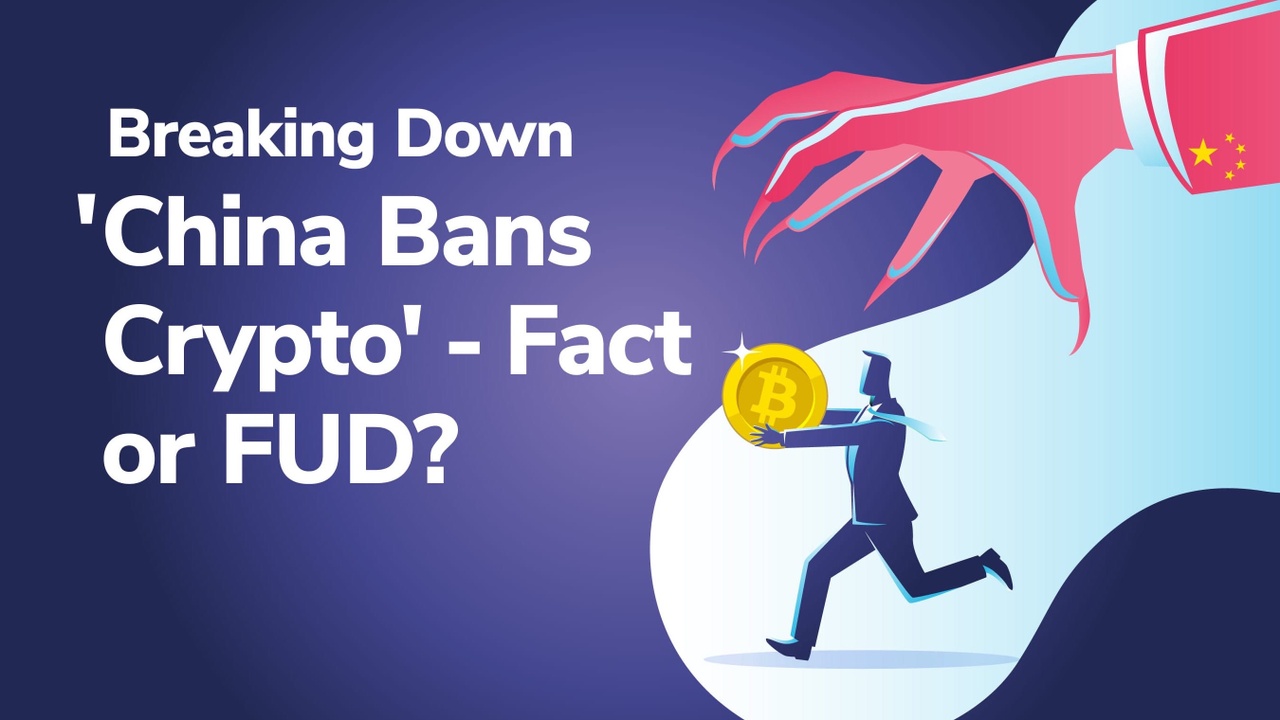
Anyone keeping an eye on the crypto news cycle will likely have seen an eerily familiar headline recently. Specifically, news outlets are again reporting that ”China bans crypto” or ”China bans Bitcoin”. However, even though headlines like that make for good clickbait, there is not a lot of substance to this news. Rather, some are accusing a recent Reuters article of spreading crypto FUD. Read on for a full objective breakdown of what FUD is and the crypto situation in China!
This article goes into the weeds on everything from the term FUD (Fear, Uncertainty, and Doubt) to the oft-seen headline ”China Bans Crypto” to the current crypto situation in China. Although there are some notable restrictions on crypto in China, mainly relating to China Bitcoin exchanges and ICOs, it’s not entirely accurate to say that China has banned crypto. Importantly, individuals in China are not technically barred from holding cryptocurrencies. This latest ”China bans crypto” Reuters article is, therefore, a good segue into a deep dive on China’s Bitcoin regulations and the concept of crypto FUD.
If you are unfamiliar with terms like FUD, FOMO, or HODL, you are likely relatively new to the crypto community. The best way to kickstart your blockchain learning journey is to enroll in Ivan on Tech Academy! The Academy features dozens of world-class cryptocurrency courses. Our Crypto for Beginners and Blockchain and Bitcoin courses are great places to start, even if you have zero previous experience. In fact, our courses cover everything from DeFi to Ethereum Smart Contract Programming, Algorithmic Trading and Technical Analysis, blockchain game development, a Polkadot course, and much, much more. What are you waiting for? Join the Academy today and take your first steps towards becoming a blockchain hero!
What is FUD?
In order to answer what FUD is, we first need to answer ”what does FUD stand for”. Specifically, the term FUD stands for ”Fear, Uncertainty, and Doubt” – often abbreviated to FUD. Now that we know what the acronym FUD stands for let us dive deeper into the actual meaning of the concept. If we want to define FUD, it is when someone, consciously or unconsciously, influences the perception of something by spreading misleading or false negative information about it. Such false or misleading information can sow doubt in investors’ minds.

This concept of spreading fear, uncertainty, and doubt may seem like a modern practice, but it’s an age-old practice. For example, a famous example in classic literature is found in Shakespeare’s Othello, in which Iago sows fear and doubt in Othello’s mind. Nevertheless, the stock market and crypto markets are both prime examples of where FUD can drive price action. Traditionally, the financial markets seek to avoid uncertainty. As such, even false FUD could have a lasting impact. Although it’s simplistic to say that it is because of FUD Bitcoin or the stock market takes a price drop, the two are interrelated.
With this in mind, it is clear that it is important to know what to look for in order to avoid FUD. The best way to avoid crypto FUD is to DYOR, Do Your Own Research, and learn the ins and outs of crypto. When faced with blatantly false FUD crypto enthusiasts oftentimes know what to look for. Now you might be thinking that you’re too new to crypto to identify crypto or Bitcoin FUD. If so, enroll in Ivan on Tech Academy and learn all there is to know about cryptocurrencies! Join over 30,000 students at our premier blockchain academy!
”China Bans Bitcoin”
It will seem to some that headlines announcing ”China bans Bitcoin” or ”China bans crypto” are almost as frequent as headlines claiming ”Bitcoin is dead” (at the time of writing, 99Bitcoin’s Bitcoin Obituaries says Bitcoin has been declared dead 413 times). Likewise, the phrase ”China bans crypto” has nearly become a meme on its own.
Before going into the details, make sure not to panic over the recent flurry of headlines declaring that China is banning Bitcoin. No, China did not just issue a blanket ban on the asset class for Chinese individuals holding cryptocurrencies. In fact, Chinese law protects virtual private property like cryptocurrencies. Chinese industry bodies did, however, reiterate an existing ban from 2013 and 2017, which states that financial and payments institutions cannot offer cryptocurrency services to clients.
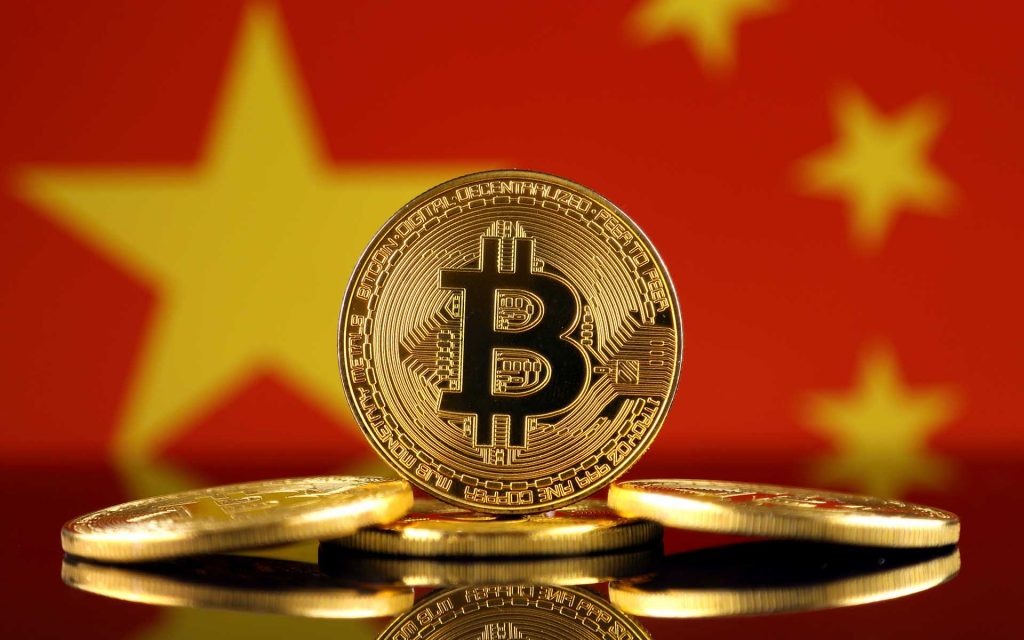
Now, although China hasn’t outright banned cryptocurrency ownership, it is clear that China is trying to deter it. After going through the recent ”China Bans Crypto” Reuters article that kickstarted this latest discussion, we’ll go through China’s Bitcoin regulation. What’s more, read on for a full breakdown of the very real restrictions that deter cryptocurrency adoption in China. This shows that while China has not put a complete ban on cryptocurrencies in place, it is making it increasingly hard for people to interact with the asset class. As a result, it is easy to see why the headline ”China bans Bitcoin” remains such a persistent clickbait title in articles year after year.
Reuters’ Recent ”China Bans Crypto” Article
The most recent news regarding whether China has banned Bitcoin and crypto or not largely stems from a Reuters article. On May 18th, Reuters published an article alleging China is prohibiting financial institutions and payment providers from dealing with cryptocurrencies. What’s more, the article also said China is advising investors against speculative crypto trading. Practically speaking, this news makes it clear that institutions like banks cannot offer cryptocurrency services to their clients. Nevertheless, while Reuters portrays this as breaking news, this actually seems to be an old announcement.
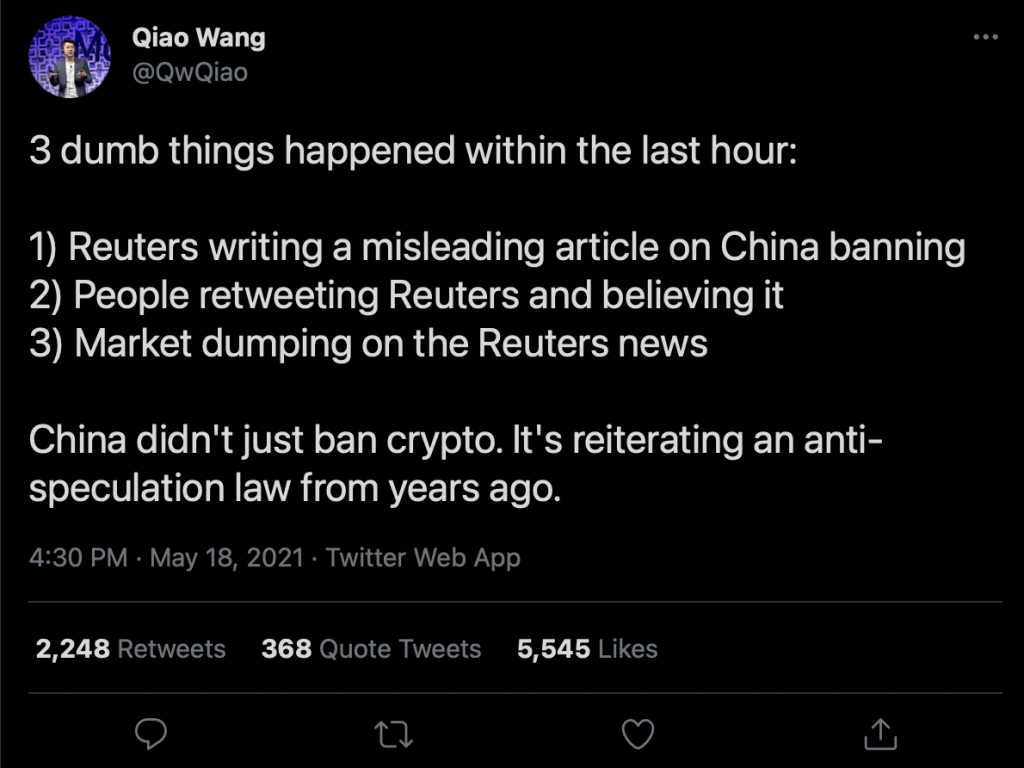
According to Chinese crypto watchers, this latest statement only repeats ”an anti-speculation law from years ago”. The tweet from Qiao Wang stating this is attached above. What’s more, the cautionary statement did not come from the Chinese central bank. Rather, it was a joint statement from the China Banking Association, the National Internet Finance Association of China, as well as the Payment and Clearing Association of China. The statement also reiterates that China Bitcoin exchanges and crypto exchanges are illegal – but this has long been the case.
For anyone interested, the original statement can be found here, published by Shanghai Securities News. More specifically, the Chinese statement notes some of the risks relating to cryptocurrency trading. For example, it highlights that digital trading contracts do not have protection under Chinese law. What’s more, the statement also mentions that cryptocurrency prices can potentially be manipulated and that virtual assets are intangible. Considering all this, some in the crypto community are accusing Reuters of spreading FUD. Let us, therefore, take a look at everything there is to know about Bitcoin regulation in China and whether the headlines stating that ”China is banning crypto” are FUD or fact. That way, you can DYOR and decide for yourself!
China Bitcoin Regulation
To get to the core of the issue with these frequent ”China bans Bitcoin” articles and the most recent ”China bans crypto” Reuters article, let us take a look at China’s Bitcoin regulation. Put simply, the Chinese regime has long had regulations that do not look too kindly on crypto. Nevertheless, it is important to separate this China Bitcoin regulation from the Chinese government’s outlook on cryptocurrency technology. In fact, China appears to be a big fan of blockchain technology and the premise of digital currency. However, it seems that China dislikes the loss of control widespread cryptocurrency adoption would entail.

We’ve previously written about China’s central bank digital currency (CBDC) project, the digital yuan, in our article on different global approaches to crypto regulation. As such, it is abundantly clear that China is open to digital currencies, like cryptocurrencies, as a concept. Nevertheless, a central tenet of the philosophy underpinning cryptocurrencies is the notion of decentralization. Essentially, many believe cryptocurrencies should be free for anyone to use and should never require the existence of central banks. Consequently, CBDCs compromise a core aspect of cryptocurrencies.
China’s hesitancy to accepting crypto shines through in other areas as well. While it’s worth repeating that China hasn’t put an outright blanket ban on crypto, the technology has some considerable restrictions. For example, China’s Bitcoin regulation includes a longstanding ban on initial coin offerings or ICOs. Those unfamiliar with the concept of ICOs should check out our Coinbase IPO article, where we explain both ICOs and IPOs. Furthermore, the Chinese government is also cracking down on Bitcoin mining. With the current Bitcoin China regulation, it is clear that general cryptocurrency adoption is facing some issues in the Middle Kingdom. Let’s look more closely at some of the Chinese crypto restrictions that exist.
China Bans Crypto ICOs and Bitcoin Exchanges
In late 2017, Chinese regulators began a relatively harsh cryptocurrency crackdown. This incident is likely what gave first gave rise to the notion that cryptocurrencies are banned in China. Although crypto assets were not outright outlawed, the People’s Bank of China declared that initial coin offerings (ICOs) were illegal.
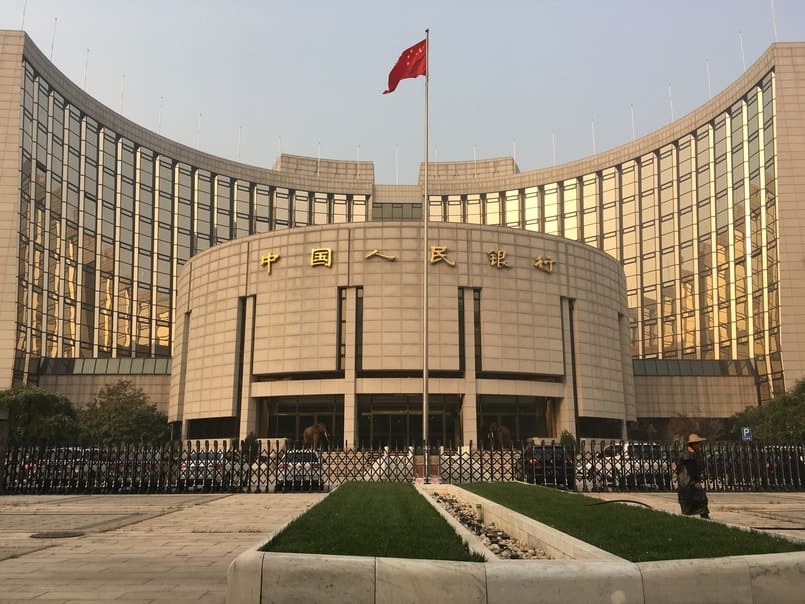
With that said, however, this Chinese crackdown was not without precedent. Back in 2013, China first began to target various China Bitcoin exchanges. At the time, Bitcoin was trading below $600, and the People’s Bank of China told China Bitcoin exchanges to cease trading with Bitcoin by January 1st, 2014. The following graph shows just how much the price of Bitcoin has risen since China banned Bitcoin exchanges.
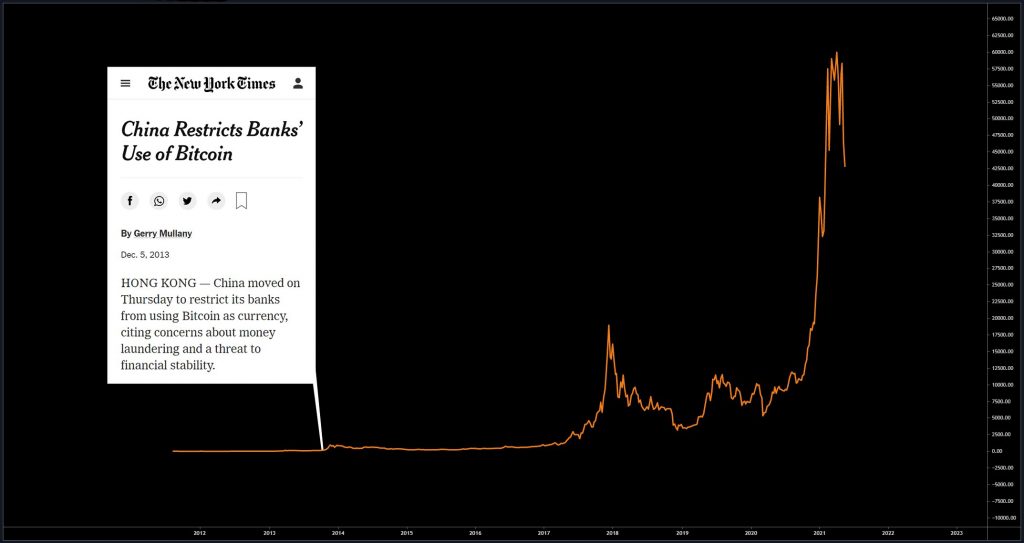
These two significant restrictions, imposed in 2013 and 2017, respectively, are reportedly now being reiterated. As such, China’s ban on crypto ICOs and China Bitcoin exchanges is now once again being categorized as that China is banning Bitcoin. Until something changes, however, this news appears to be nothing more than another case of crypto FUD.
Why Did China Shut Down Bitcoin Mining?
It is worth mentioning that, even though the most recent news of China banning Bitcoin are largely overblown, there have been relatively recent developments in the Chinese cryptocurrency world. Specifically, China has reportedly begun to more actively deter Bitcoin mining in the nation’s Inner Mongolia region.

Earlier this month, a Fortune report detailed how the provincial government in China’s Autonomous Region of Inner Mongolia put a Bitcoin mining ban in place in March. According to the report, the Bitcoin mining ban displaced roughly 8% of the global Bitcoin hashrate. At the time, the provincial government cited heavy pollution as the reason for the ban. Inner Mongolia is China’s greatest coal producer and was the only Chinese region set for energy reduction in 2019 to surpass its energy quota. As such, it is possible that the Inner Mongolia Bitcoin mining ban was an isolated event.

According to Da Hongfei, the founder of the China-based blockchain platform Neo, this was nothing but a one-time occurrence. Additionally, many Chinese Bitcoin mining operations have already relocated to other parts of China, such as Sichuan and Xinjiang. Da Hongfei suggests that the Inner Mongolia Bitcoin mining ban was ”an isolated event that will not significantly affect other mining ecosystems”. However, even if that is the case, it is a very real example of how China is deterring cryptocurrencies.
Summary of Breaking Down ”China Bans Crypto” – Fact or FUD?
The recent articles claiming that China is suddenly banning crypto are likely at best uninformed or just outright FUD. It is true that China is deterring the use of cryptocurrencies. It is also true that China has preexisting restrictions on crypto exchanges as well as on initial coin offerings. Nevertheless, most recently, it would appear that China merely went on to reiterate its stance from 2013 and 2017. China did not ban individuals overnight from holding crypto.
Rather, recent articles simply repeat existing information about the Chinese stance on crypto and Bitcoin, and claim ”China bans crypto”. Until some new piece of information emerges, it would appear nothing has changed about China’s stance on cryptocurrencies. Until then, however, be sure to enroll in Ivan on Tech Academy! Learning more about cryptocurrencies and getting the necessary skills to land a job in crypto is invaluable. What’s more, be sure to follow the Ivan on Tech Academy blog for daily deep-dive articles on subjects like this!
